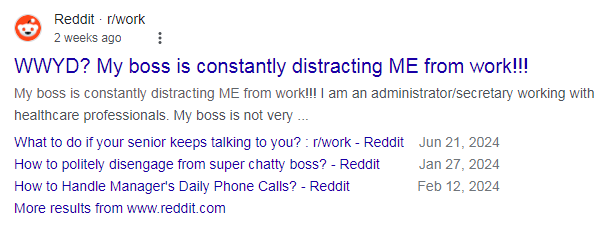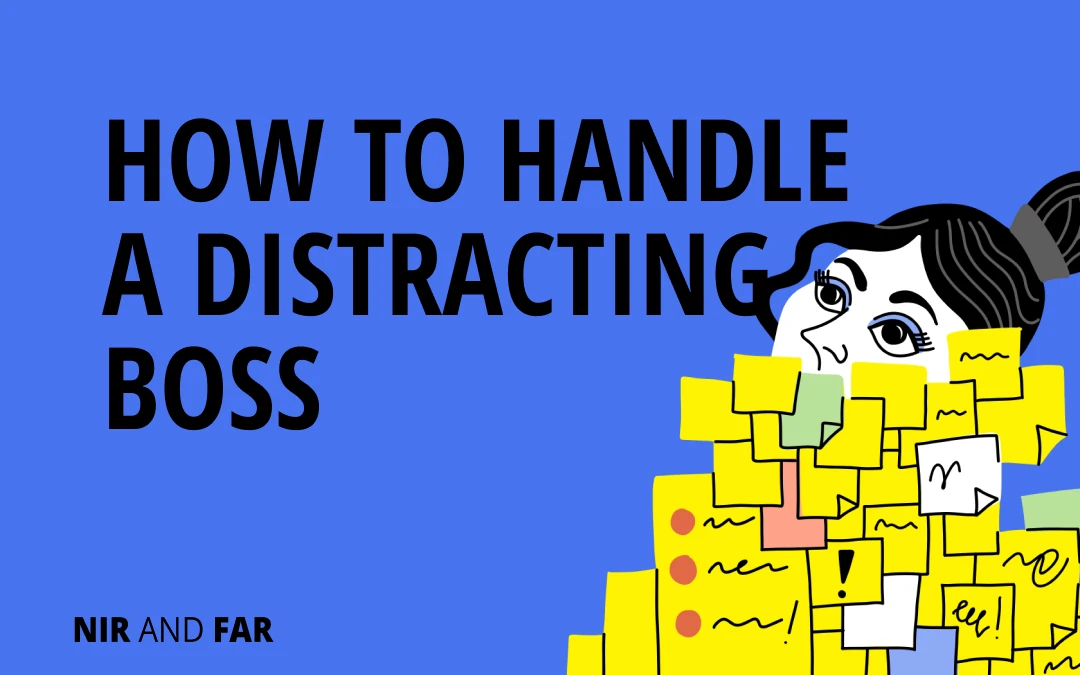See if you can relate to Sarah.
She’s a software engineer who loves her job—except for her manager, Tom. To Tom, everything is a crisis worthy of interrupting Sara, even when she’s deeply focused on her work.
One morning, while Sarah is coding a critical feature, Tom calls and asks her to drop everything to help with an urgent report for the CMO. Sarah complies, but by the end of the day, she hasn’t dedicated much time to any of the tasks she planned to focus on.
It wouldn’t frustrate her so much if this were a one-time situation. However, Tom’s frequent interruptions keep her from doing her best work.
Does that sound familiar?

I’ve written extensively about how managers and employees can work well together; check out “Managers, Stop Distracting Your Employees” and “‘Just Say No’ Is Bad Advice.”
But what if you’re not in a leadership position?
What if you meticulously follow the four steps from my book Indistractable to control your attention and reclaim your focus—yet your boss hasn’t read it and won’t let you do your work?
How do you stay indistractable when you have an easily distracted boss?
What Is a Crisis?
Sometimes, we must adapt to the unexpected. Things happen. The trouble is that too many things bosses think are crises aren’t.
Let’s get our definition clear. What is a crisis? To me:
A crisis is an unexpected event requiring immediate attention.
It shouldn’t be a crisis if you could have prepared for it.
Of course, if your boss fails to plan for that CMO report and the boss’s boss is waiting on the line, now it’s a crisis. But your boss is at fault for not planning ahead. The crisis is your boss dropping the ball; that’s the surprise, not the need for the report.
CMOs need reports. Kids get sick and need to be picked up from school. Clients need to talk urgently. These events are all predictable.
You may not know precisely when they will need your attention, but you can predict with 100 percent certainty that they will sometimes threaten to interrupt your plans.
The solution is a contingency plan. You can plan for surprises!
What does a heart surgeon do in the middle of surgery if their kid is sick and needs to be picked up from school or someone from the hospital administration wants to talk with them? Do they let the patient die on the operating table? Of course not. They have plans in place, just in case.
Suppose your board members have been known to call you with urgent requests prior to every board meeting. If this is the case, you, the employee, can anticipate these requests and timebox your availability to be on call to assist.
But you won’t be able to do everything at once. Alert your boss to that fact and confirm that’s what they want you to do: “I’m happy to be available in case the CMO calls, and I can’t wait to make the team look good. However, that means I won’t be able to do focused work during that time because I need to be ready for the call.”
Either you’re doing focused work or you’re the point person ready for the “unexpected.” Of course, you could do other work while being on standby, but that’s a bonus, not an expectation. You can have only one priority at a time.

Still, there’s more to the definition of crisis than the element of surprise. There’s the part about “immediate attention.”
Too often, novice managers fail at their one and most important job: prioritization. They think everything should be done all at once. When the manager makes everything urgent, employees can’t do their best work because their attention is scattered, and they’re likely to burn out.
Thankfully, there’s a fix for helping your boss prioritize better.
Free Schedule Maker Template
Take back control of your time and design your ideal day.
Your email address is safe. I don't do the spam thing. Unsubscribe anytime. Privacy Policy.

Schedule-Syncing Is Key
The best tool I have found for working effectively with a manager is schedule-syncing.
Schedule-syncing gives others transparency into how you intend to spend your time. Managers love it because they want to know what you’re doing all day, and employees love it because it allows them to align with their manager without being micromanaged.
The first step to schedule-syncing is timeboxing your calendar, blocking off time each day for the work you plan to do. Use this free schedule-maker to get started.
Once you have a timeboxed calendar, schedule a meeting with your boss to review it together.
Bring a list of all the extra tasks and responsibilities your manager has asked you to complete but that you can’t fit into your timeboxed schedule.
In the meeting, review your calendar and the extra tasks list with your manager. Say, “Here’s how I plan to spend my time this week, and here’s everything you’ve asked me to do that I’m having trouble fitting in. How would you like me to prioritize?”
The manager’s most important job is prioritizing tasks. By giving your manager a look into how you plan to spend your time, you decrease the likelihood that they will interrupt you. They’ll see you have set hours for uninterrupted, focused work, which are essential for completing key tasks.
But I Need to Be Always On
Sometimes, readers tell me that I just don’t understand—their work requires them to be always interruptible. Sure, some jobs are on call. If you work in a call center, you pick up the phone when it rings. However, most jobs have some balance of reflective and reactive work.
Reflective work can be done without distraction. Planning, strategizing, and thinking all require focus.
Reactive work involves checking notifications and emails and being available for taps on the shoulder from colleagues. It’s part of everyone’s job.
The trouble is when we habituate to doing reactive work all day without planning time for reflective work. It’s much easier to do what your email, Slack, or boss tells you to do now rather than ask yourself (or your boss) what’s most important.
If you don’t plan time for reflective work (to think, plan, and strategize), you’ll run fast in the wrong direction.
“But I just can’t!” is a reaction I sometimes hear when I advise people to plan time for working without distraction. “My workplace is different.”
In that case, the problem might be someone other than your boss. It might be you!
Most of the time, when people say, “I need to be on call. I need to be responsive,” it’s not an objective fact but a subjective feeling that drives them toward distraction. They can’t stop telling themselves, “Someone might need me,” “I fear I might look bad,” or “I’m anxious knowing that there might be a message waiting for me.”
Those are not objective truths; they are just uncomfortable feelings. Nagging internal triggers distract people who are unable to deal with them.
If you’ve done your job correctly and schedule-synced with your boss, relax! You did your duty. You don’t need to cater to every ping and ding or give into the fear that someone needs you when, in reality, they can wait a few minutes.
When Your Boss Is Just a Bad Boss…

In those cases, employees shouldn’t resign themselves to a bad boss. Pull the parachute if you’ve tried everything to improve your relationship with your manager and nothing has helped. Making that person a good leader is outside your locus of control, so focus on what is in your control: Look for another job.
The relationship between managers and their employees can be tricky to navigate, but most of the time, schedule-syncing and managing our internal triggers effectively can steer the way.
Related Articles
- Schedule Maker: a Google Sheet to Plan Your Week
- Habit Tracker Template in Google Sheets
- The Ultimate Core Values List: Your Guide to Personal Growth
- Timeboxing: Why It Works and How to Get Started in 2025
- An Illustrated Guide to the 4 Types of Liars
- Hyperbolic Discounting: Why You Make Terrible Life Choices
- Happiness Hack: This One Ritual Made Me Much Happier

